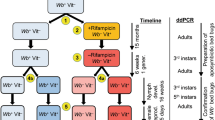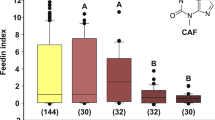Abstract
IT is well known that, during starvation, the bed-bug, like many other insects, swallows considerable quantities of air, which serve to maintain the body volume in place of the food and tissues that are consumed. I have recently observed that if the first stage larvae of the bed-bug are kept for several weeks in a moderately dry atmosphere (for example, 50 per cent relative humidity at 23° C), as the circulating fluids become less, the gut, containing bubbles of air, becomes herniated into the bases of the limbs, and may extend far down the femora (Fig. 1).
This is a preview of subscription content, access via your institution
Access options
Subscribe to this journal
Receive 51 print issues and online access
$199.00 per year
only $3.90 per issue
Buy this article
- Purchase on Springer Link
- Instant access to full article PDF
Prices may be subject to local taxes which are calculated during checkout
Similar content being viewed by others
Author information
Authors and Affiliations
Rights and permissions
About this article
Cite this article
WIGGLESWORTH, V. Effect of Desiccation on the Bed-bug (Cimex lectularlus). Nature 127, 307–308 (1931). https://doi.org/10.1038/127307b0
Issue Date:
DOI: https://doi.org/10.1038/127307b0
This article is cited by
-
Presence of undigested haemoglobin in the small intestine and haemolymph ofTriatoma infestans (Reduvvidae) infected withBlastocrithidia triatomae (Trypanosomatidae)
Parasitology Research (1990)
-
Eine merkwürdige Blausäureschädigung bei Larven der Wanze Rhodnius pictipes Stål (Triat. hemipt.)
Zeitschrift für Parasitenkunde (1934)
-
Beiträge zur Biologie der Bettwanze (Cimex lectularius L.)
Zeitschrift für Parasitenkunde (1932)
-
Über Lebensbedingungen, Verhalten und Fruchtbarkeit der tropischen Hauswanze Cimex rotundatus Sign. (Hex. rhynch.) in Venezuela Beiträge zur experimentellen Parasitologie 7
Zeitschrift für Parasitenkunde (1931)
Comments
By submitting a comment you agree to abide by our Terms and Community Guidelines. If you find something abusive or that does not comply with our terms or guidelines please flag it as inappropriate.



